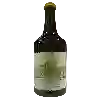
Domaine de SavagnyChâteau-Chalon
This wine generally goes well with poultry, mild and soft cheese or mushrooms.
Food and wine pairings with Château-Chalon
Pairings that work perfectly with Château-Chalon
Original food and wine pairings with Château-Chalon
The Château-Chalon of Domaine de Savagny matches generally quite well with dishes of mature and hard cheese, poultry or mushrooms such as recipes of tuna-kiri crisps, fricadella or pasta with vegetables.
Details and technical informations about Domaine de Savagny's Château-Chalon.
Discover the grape variety: Monbadon
Originally from the Charentes region, it is now endangered. It is still found in isolated stocks, most often in old ugni blanc plantations. This variety is said to be the result of a natural cross between folle blanche and ugni blanc. It is registered in the Official Catalogue of Vine Varieties, list A1. - Synonyms: frontignan des Charentes, aramon blanc by mistake in the Var, gros montils on the island of Oléron, ugni de Montpellier, burger (not to be confused with elbling and gouais blanc which have the same synonym), auba, meslier d'Orléans (not to be confused with meslier saint François) (for all the synonyms of the grape varieties, click here!)
Last vintages of this wine
The best vintages of Château-Chalon from Domaine de Savagny are 2011, 0
Informations about the Domaine de Savagny
The Domaine de Savagny is one of of the world's greatest estates. It offers 11 wines for sale in the of Château-Chalon to come and discover on site or to buy online.
The wine region of Château-Chalon
The wine region of Château-Chalon is located in the region of Côtes du Jura of Jura of France. Wineries and vineyards like the Domaine Jean Macle or the Domaine Bénédicte et Stéphane Tissot produce mainly wines white, sweet and red. The most planted grape varieties in the region of Château-Chalon are Pinot noir et Chardonnay, they are then used in wines in blends or as a single variety. On the nose of Château-Chalon often reveals types of flavors of smoke, vanilla or citrus and sometimes also flavors of minerality, apricot or ginger.
The wine region of Jura
The Jura is a small wine region in eastern France that is responsible for some very special and traditional wine styles. It is close to the Swiss Jura, but quite distinct from it. Wedged between Burgundy to the west and Switzerland to the east, the region is characterized by a landscape of Wooded hills and the winding topography of the Jura Mountains. The Jura vineyards cover just over 1,850 hectares, forming a narrow strip of land almost 80 km Long from North to South.
The word of the wine: Tiled
Said of the colour of an evolved wine that has taken on brick and orange hues.














